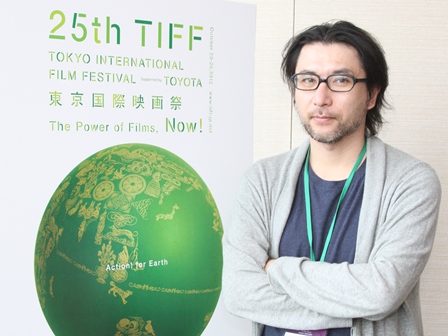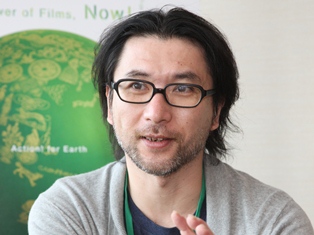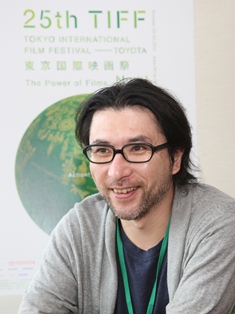Interview with Director Hiroshi Okuhara (“The Black Square”)

Hiroshi Okuhara’s “The Black Square” takes a story of time-traveling and enduring love into modern Beijing with wry commentary on China’s current art scene and the legacy of the history between Japan and China. We talked about the ideas and places that inspired him.
– First of all, do you live in Beijing now?
Hiroshi Okuhara: Yes.
– For how many years?
Okuhara: Four years.
– How did this idea for this kind of story come to you? What were you initial inspirations?
Okuhara: There are two things. One is that I visited Beijing for the first time in 2008. I didn’t know anybody there. I met various people and one of them took me to the Song Zhuang Artist Village in Beijing. Some people say 5,000 people live there. Some 3,000. But anyway, a lot of artists live there. I visited there a lot. Then I met some people. I became friends with them. We became drinking buddies. At that time I didn’t speak Chinese, but the whole atmosphere felt like science fiction, including the surroundings. I felt I could shoot a Tarkovsky-like movie in this place. In other words, the only theme that came up was a science fiction idea. That’s how it all began.
The second thing is themes of this film are about ghosts and love. And when it comes to ghosts, I actually felt it, in a way. Beijing has been one of the most important cities in China for more that 2,000 years and every time power changes they recreate the town. They paint it over and over again, whenever there’s a power shift. And when I read history books about China or Beijing you really feel the power struggles over the years. I mean, millions of people have been killed and massacred in Beijing. And I felt it. And perhaps one more thing that could be the third inspiration for this film is the Sino-Japanese War. And in this suburb there aren’t too many high rises. I really felt what was happening during the war. And when I was walking through the small streets I felt that if I turned a corner maybe some Japanese soldier might be standing there. So, I had this image and maybe that’s the inspiration I felt from the city of Beijing.
And the other theme of this film is love. Actually my first draft of the screenplay didn’t have this love story in it. But when the actor, Hideo Nakaizumi, came on board – when we decided to have him play Black Square – because he’s such a good looking guy, we decided to make it into a love story. I started a bit lightly, but as I was rewriting the script I realized that the love story and the ghost story might actually be the same thing. So this became the core of the story.

– I also wonder if the Black Square, a man out of time, out of place has a personal relation to you, being a Japanese person living in China right now.
Okuhara: No, it’s not really about my personal experience at all. It was more conceptual. We had an idea and it developed from there.
– Let’s talk about the black square, not the person, but the square itself and its beginnings as an idea for you. It starts off as a black painting. There’s a long tradition in art history of black paintings from Kasimir Malevich to Ad Reinhardt and beyond. Then it turns into something else. It turns into the door, the portal. Can you talk about how this developed, its symbolism and meaning?
Okuhara: In the Artists Village there are a lot of unsuccessful artists. When I visited the place for the first time it was during the bubble for modern art in China. A lot of American and European art buyers came to China to speculate on the art. So they started buying up works from all these artists to raise their prices. In this village a lot of the unsuccessful artist don’t have much money, so they just get together and get drunk and whatever. But sometimes one of them gets picked up by the buyers and they leave this circle. I didn’t meet any of the successful ones. The ones I met were the ones who remained there. Of course they still get together and get drunk and speak ill of the successful and rich ones who left. I thought it was very interesting and I wanted to recreate the feel of that scene. And I wanted to focus on the line, “Why the hell does this black painting cost so much?” Also, the black square wasn’t there in the beginning. I wanted to have something from which the man appears, but I didn’t want it have too much meaning. For example, I didn’t want to be too much like the monolith in “2002: A Space Odyssey.” That has a strong meaning. It has a weight to it. It’s a holy object. I didn’t want it to have that sort of influence on the black square, but I also didn’t want it to be too unrelated. If it weren’t related the audience would have wondered why it’s there, so they’d be thinking about it rather than following the story. Not too much, but not too little a relationship.
– The black square exist in this big open space. Is this like Tarkovsky’s zone in “Stalker?”
Okuhara: I just happened to use Tarkovsky’s name because it was easy to help explain the idea. I wasn’t thinking about science fiction when I was shooting. But we really thought about the location because it’s a very low budget movie. When people go to the theater they still have to pay the same price as a big budget film. Nowadays, small art cinemas are struggling and it’s very difficult to get audiences. So I thought, we could make a difference, make it worthwhile without spending too much money. I thought maybe, if we had a good location…

– Back to the art scene in there, could you tell me a little about Gouzi, the drunken writer performance artist.
Okuhara: Gouzi means dog.
– I understand he’s a genuine writer and performance artist.
Okuhara: Gouzi is actually quite a famous person in the underground scene in Beijing. He’s written a few novels and he writes criticism about theatre. I’ve never read any of his stuff. But the director Lim Kah Wai shot a feature film in Beijing featuring Gouzi. I was very impressed by him. I thought when I make my own film I’ll have Gouzi in it. I asked him to be in my film and he said he was busy looking after his kids and if he had time maybe he could show up.
– In the historical story there’s the Japanese soldier meeting the Chinese brother and sister. It moves forward to the present with the brother becoming Zhia Ping and he now has a Japanese girlfriend. So there are these Japanese-Chinese relationships. And there’s Lihua’s story. She talks about writing a novel that’s a key to what’s happening. Could you talk a little bit about these dualities? Her ideas of tribes and disappearing into love?
Okuhara: Lihua’s writing a novel. It’s funny that a lot of female university students in Beijing say that they’re writing novels or screenplays – even if they aren’t literature or art majors. Girls often tend to say stuff like this. I wanted Lihua to be like the students are now in Beijing. So that’s why I wanted her to be writing a book. That was beginning of that. But when you want to write a story about modern times and the past, you often have to compare them. And there’s a dichotomy that goes one. One tends to become very rigid. But I wanted have more development from that, so this novel was used to go out of, or beyond, the dichotomy. I didn’t want the Japanese-Chinese relationships to be too obvious, so what’s in the film is a pretty good balance. Not too much, not too little.
– You had mentioned that perhaps this film will be difficult to show in China now because of political relations and there are few art houses anymore. Where do you hope to show this film?
Okuhara: I do hope to show it in China, but it has to pass censorship. Nothing is allowed to be shown in cinemas in China with being seen by the censorship board – including independent films. As long as you are asking them to pay for it, it has to pass censorship. It’s OK if you want show it in a art gallery or wherever and you don’t charge for it. But I don’t want to do any free screenings because once you do that, it may show up on the Internet and it may be pirated. So it’s difficult. One of the producers of this film is Chinese and he really wants to show it in China. In order to get approval we may have to re-edit it. But right now, because of the Senkaku Islands problem, even if we re-edit it’s even more difficult. So maybe we’ll take our time. But my version’s finished. I’m leaving re-editing to the producers. But am at the same time, I am interested in showing the film in China. We need to recoup our costs. I’m sure the whole story is going to be re-edited and look nothing like it is right now. But when it’s released I curious as to where they’ll show it and how much money it will make and how many people will come to see it. I’m interested in those things.
– Good luck!
Interview by Nicholas Vroman



















